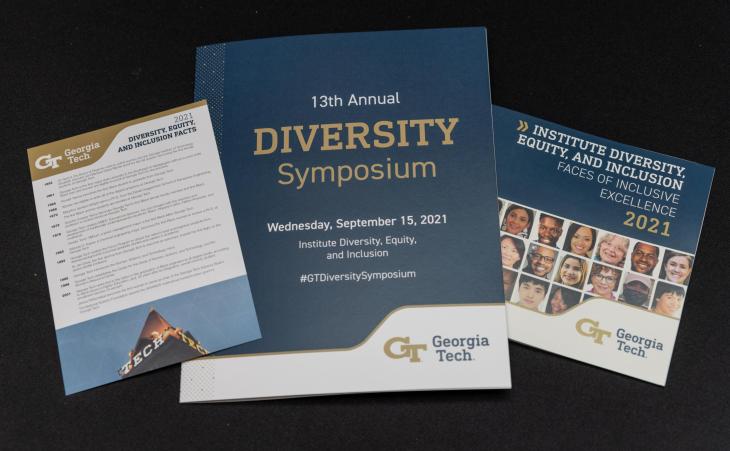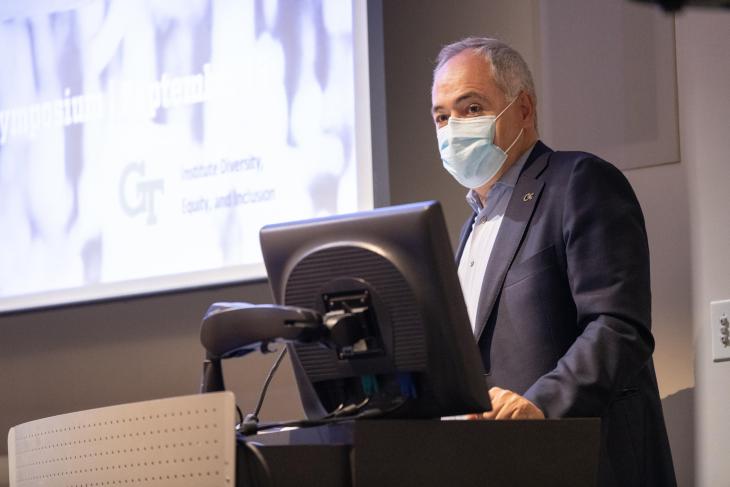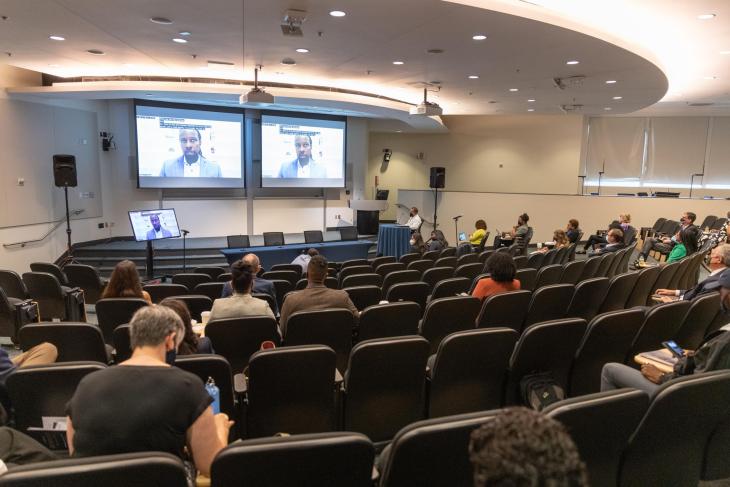
Sep 20, 2021
The 13th annual Georgia Tech Diversity Symposium was hosted Sept. 15, 2021.
Sponsored by Institute Diversity, Equity, and Inclusion (IDEI) the event returned to the Global Learning Center for in-person morning panel sessions, lunch, and diversity award presentations for the first time since it welcomed Georgia Tech’s Black Trailblazers to headline the Symposium in 2019. IDEI offered limited seating in room 236 and also provided the campus with a virtual viewing option.
In total, the hybrid event was seen by more than 600.
“Each year, the Georgia Tech Diversity Symposium presents an important opportunity for all of us as members of the Tech community to come together to engage in important conversations about challenges and solutions to advance our journey toward becoming a more inclusive and welcoming campus for its members,” Archie Ervin, vice president of IDEI and co-chair of the event's planning committee said.
Titled “The Globalization of Anti-Racism Activism,” the event included campus members and issue-area experts who spoke to share experiences with race and the rise of anti-racism movements locally, nationally, and worldwide — particularly after the 2020 deaths of Ahmaud Arbery, Breonna Taylor, and George Floyd.
The tone was quickly set for the day, beginning with remarks by Ervin, Georgia Tech President Ángel Cabrera, and Ivan Allen College Associate Professor André Brock, who warmed the virtual stage for the event’s keynote virtual speaker, noted historian Ibram X. Kendi, bestselling and prizewinning author of Stamped from the Beginning: The Definitive History of Racist Ideas in America, and How to Be an Antiracist.
Kendi and Ervin engaged in a 45-minute fireside chat discussion.
“In the unlikely event someone hasn’t read How to Be an Antiracist,” Ervin began, “what does it mean to be antiracist?”
“So, I think, first and foremost, it is important to start my answer with racial inequities [examples],” Kendi responded from his Boston office. “Black and brown people in this country are overrepresented in the incarcerated population. They’re more likely to be killed by the police. They’re more likely to be impoverished, and since this pandemic, they’ve been the most killed by Covid.
“There are largely two explanations for why racial disparities and inequities exist: One idea is racist policies and another idea is racist ideas," Kendi continued. "Typically, people who reject that racial policies are causing racist disparities, turn around and then claim that the reason Black people are overrepresented in prison populations is because they are more violent and commit more crimes because they’re more inclined to violence and criminality — which suggests that Black people are more criminal-like than other groups, which suggests that Black people are inferior... which suggests the racist idea.
“And so to be antiracist is to first and foremost recognize all racial groups as equals. It doesn’t mean that all people are the same, but behaviorally and genetically that the races are equal. What this means [to be antiracist] is that we have a disparity; it means there are racist policies and racist practices and to be antiracist is to try to uncover these policies and eliminate them.”
Kendi is a contributing writer at The Atlantic and a CBS News correspondent. He is also the Andrew W. Mellon Professor in the Humanities at Boston University and founding director of the BU Center for Antiracist Research.
“Let me turn to the focus of our program, which is anti-racism activism across the globe,” Ervin continued. “Why do you think the video recording of George Floyd's murder last May at the hands of police launched a powderkeg of anti-racism movements worldwide?”
“Before we saw Floyd’s murder and the circulation of his video, there was already a growing awareness,” said Kendi. “Those of us who work in racial and equity work had been reeling, for about two months, that Black people in particular had been dying at the highest rates from Covid-19. So there was already outrage about just how racism itself is a public health emergency. That, combined with the fact that people were quarantined and were widely able to see the gruesome murder all at once, launched the worldwide rage.”
The Ervin-Kendi discussion was followed by a question-and-answer session featuring Kendi versus the in-person and virtual audiences.
The event continued with a panel conversation, “Global and Local Connections,” facilitated by Kirk Bowman, professor with the Sam Nunn School of International Affairs and School of Economics. Panelists included: Jancy Ling Liu, School of Economics doctoral student; Dorian Brown Crosby, associate professor of political science at Spelman College; and Kevin Shanker Sinha, organizer and activist for Equity and Justice and founder of Civic Georgia. The group discussed how collective actions and community responses to local acts of racism inspire global movements, such as Asian American and Pacific Islander movements across the world earlier this year.
A second panel, “Views From Elsewhere: Race in the United States,” shared their experiences as international students in the U.S. and how their ideas of race and racism were shaped in their native countries, and reshaped once in the U.S. and from their experiences of traveling abroad.
Sabir Khan, associate professor in the School of Architecture and School of Industrial Design, facilitated the discussion between the group: Bangseh Akuchu, alumnus and graduate student in the Scheller College of Business; Jhordan Channer, alumnus and adjunct professor at the Caribbean School of Architecture; Mandani Tennakook, undergraduate student in the School of Civil and Environmental Engineering; and alumni Kyla Dowlen and Joel Jassu.
Diversity Awards Presentations
After a break for lunch, the afternoon kicked off with the Diversity Symposium’s annual awards presentations of the Diversity Champion Awards and Faces of Inclusive Excellence.
The Diversity Champion Awards annually recognize a faculty member, staff member, student, and campus unit whose scholarship or work advances a culture of diversity, equity, and inclusive excellence at Georgia Tech. 2021 recipients were chosen for their engagement to advance activities that address systemic racism at Georgia Tech and abroad.
This year’s honorees were Lewis Wheaton, associate professor, School of Biological Sciences; Shaunitra Wisdom, academic advisor II, School of Architecture; Shelbe Johnson, undergraduate student, School of Chemical and Biomolecular Engineering; and the Equity Collective, a group of 17 Office of Undergraduate Education division leaders, faculty, staff, and students who “collaborate in ambitious working groups to significantly advance the collective’s core priorities,” such as advancing equity-based facilitation training.
Faces of Inclusive Excellence annually recognizes a diverse group of faculty, staff, and students who are committed to advancing a culture of inclusive excellence at Georgia Tech and who have distinguished themselves in their research, teaching, and/or service. This year, 64 diverse honorees were featured in its printed publication.
“These are the real faces of inclusive excellence at Georgia Tech,” Ervin said, as he held up the booklet, addressing the crowd.
The event ended with closing words from Ervin, but not before a summation of the day, ‘Where do We Go from Here?’ by Associate Dean of Students Stephanie Ray, who ended her remarks with a passionate rendition of James Patrick Kinney’s "The Cold Within.”
The event was presented by the 2021 Georgia Tech Diversity Symposium Awards Planning Committee, chaired by Ervin and Co-Chair Carol Colatrella, professor in the School of Literature, Media and Communication and co-director of the Center for the Study of Women, Science and Technology.
Committee members included: Adjo Amekudzi-Kennedy, professor and associate chair, School of Civil and Environmental Engineering; Tamara Ballou, marketing and event coordinator II, Institute Diversity, Equity, and Inclusion; Melanie DeMaeyer, assistant dean of students and director, Women’s Resource Center; Amy Bass Henry, executive director, Office of International Education; Courtney Hill, communications manager, Institute Diversity, Equity, and Inclusion; Tia Jewell, program and portfolio manager, Institute Diversity, Equity, and Inclusion; Shiraz Karaa, counselor, Georgia Tech Counseling Center; Sabir Khan, associate professor, School of Architecture and School of Industrial Design, and director, International Education, School of Architecture; Keona Lewis, associate sirector of Institute Diversity Research, Institute Diversity, Equity, and Inclusion; Tegra Myanna, director, LGBTQIA Resource Center; Sebnem Özkan, associate director, Atlanta Global Studies Center; Shamecia Powers, assistant director, administrative operations, Office of International Education; Stephanie Ray, associate dean of students, and director, Student Diversity Programs; Julian Rimoli, associate professor, School of Aerospace Engineering; Catherine Ross, Regents Professor and Harry West Chair, School of City and Regional Planning; Anna Stenport, dean, College of Liberal Arts, Rochester Institute of Technology; John Stein, associate vice president for Student Engagement and Well-Being and Brandt-Fritz Dean of Students Chair; Carol Sullivan, senior academic professional, Center for Teaching and Learning; and Ashlee Toomey-Flinn, Education Abroad Scholarships advisor and marketing specialist, Office of International Education.
To learn more about the 2021 Diversity Symposium, visit diversity.gatech.edu/13th-annual-georgia-tech-diversity-symposium.
Photo and video credit: Georgia Tech Institute Communications


